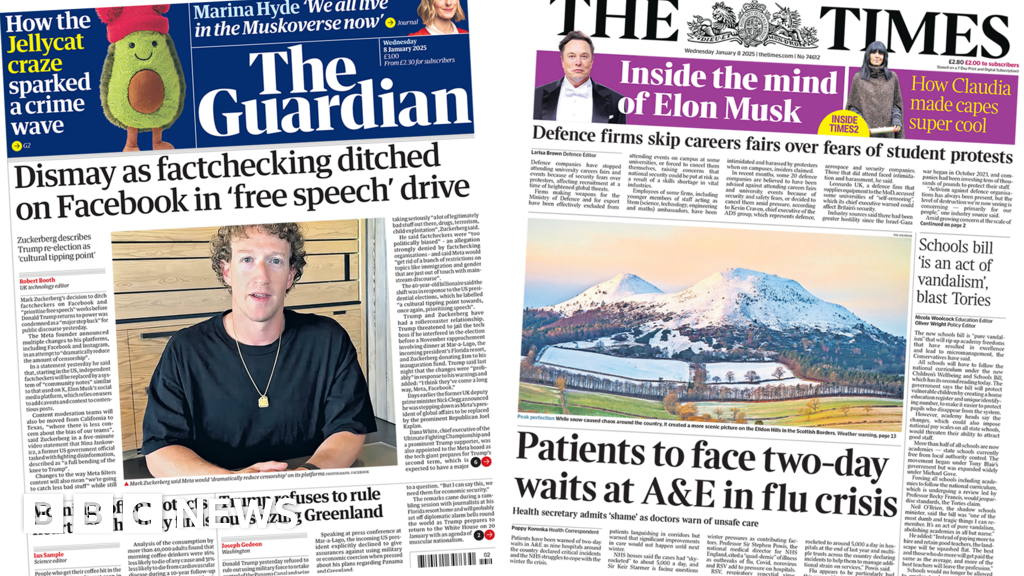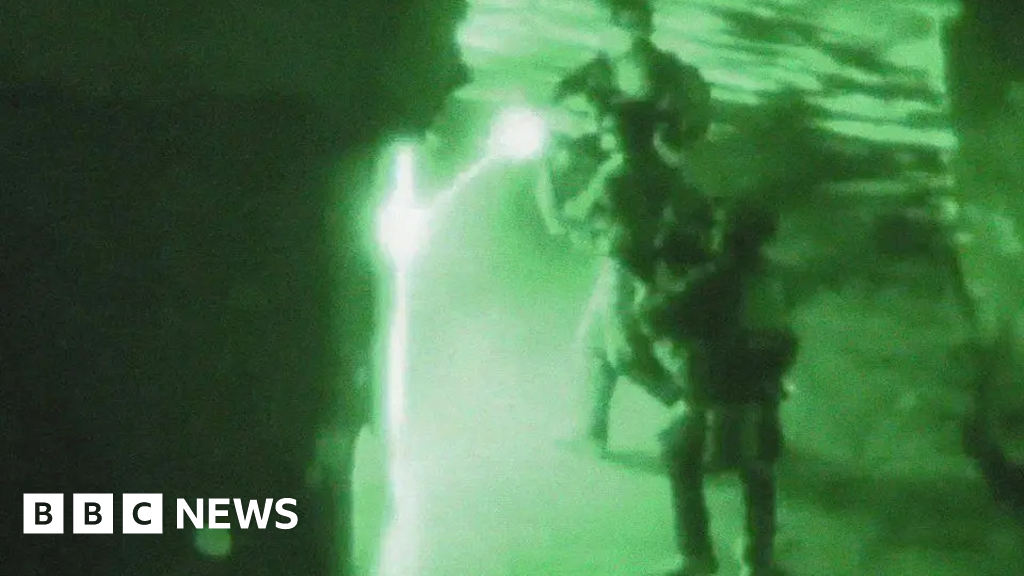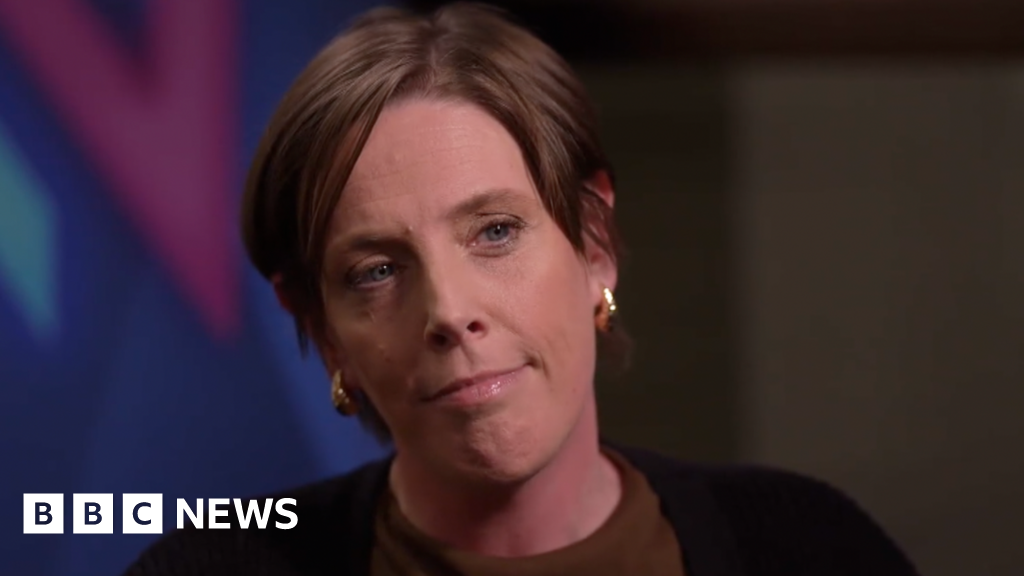
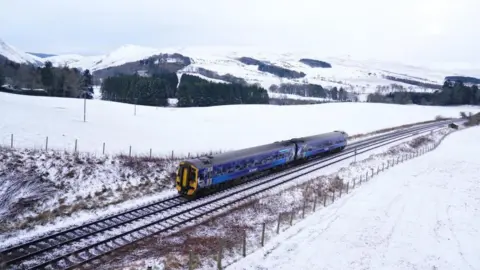 PA
PA
Travel disruption caused by the cold and wet weather continued into Monday
Major incidents have been declared and dozens of people rescued in Lincolnshire and Leicestershire as heavy rains caused severe flooding in the Midlands on Monday.
Firefighters in Leicestershire received hundreds of calls on Monday, and rescued dozens of people, while in Lincolnshire 50 children were taken to safety after their school was cut off by floodwater.
Meanwhile, police in North Yorkshire are appealing for help to identify the body of a man found in floodwaters in Beal, close to Eggborough and Knottingley.
Almost 200 flood warnings have been issued in parts of England, while yellow weather warnings for snow and ice have been issued in Northern Ireland, parts of Scotland and Wales and areas of northwest and southwest England until Tuesday morning.
Snow, ice and rain cause disruption in the UK
Travel disruption caused by the cold and wet weather has affected much of the UK on Monday, with roads, railways and airports all affected.
In Leicestershire, crews attended incidents involving cars stuck in flooding, evacuating residents from flooded homes and dealing with rising water levels.
By Monday evening, the fire service said, 59 members of the public had been rescued from properties.
In Lincolnshire, 50 children were taken to safety after their school was cut off by floodwater and a major incident was declared in the county
All roads leading to Edenham Primary School, near Bourne, were flooded after heavy rainfall. Volunteer drivers in 4x4 vehicles drove the children through the water to safety.
Meanwhile, police in North Yorkshire say the man whose body was recovered from a flooded area in Beal is believed to have entered the water on Saturday or Sunday.
As of Monday evening, there were 193 flood warnings, meaning flooding is expected, and 305 flood alerts, meaning flooding is possible, in place across England.
In Wales, one flood warning and 16 flood alerts are in place.
A Met Office warning for snow and ice across large parts of Scotland came into force at 16:00 and will last until midday on Tuesday.
In Northern Ireland, a yellow alert for snow and ice warning will be in place until 11:00 on Tuesday.
A yellow alert for snow and ice across Wales and parts of northwest and southwest England took effect at 17:00 on Monday, lasting until 10:00 on Tuesday.

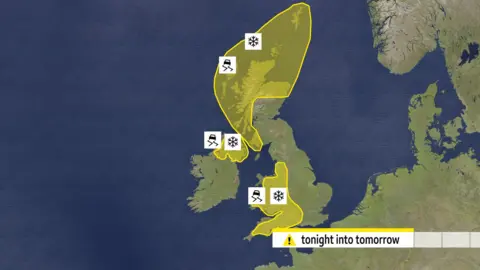
Yellow weather warnings for snow and ice are in place across parts of Scotland, Northern Ireland, Wales and western England
Prime Minister Sir Keir Starmer said his thoughts were with all those affected by the flooding and thanked "responders working hard to keep communities safe".
In the Commons, environment minister Emma Hardy told MPs flooding was "a personal priority" for her, adding that the Environment Agency was particularly concerned about Lincolnshire, Leicestershire, Warwickshire and Nottinghamshire.
Warning of further localised flooding to come over the next 24 to 36 hours, she pledged to overhaul the government's approach to funding flood defences "to ensure the challenges facing businesses and rural and coastal communities are taken into account when delivering flood protection."
Aerial footage shows severe flooding in Leicestershire
The coldest temperature of the UK winter so far was recorded on Sunday night, when the mercury hit -13.3C (8F) in Loch Glascarnoch in Scotland.
On Monday morning, snowy conditions forced schools across north-east Scotland and northern England to close on the first day back after the Christmas holidays.
Power had to be restored to thousands of homes and businesses in the north-east of England following outages caused by the cold snap, according to network operator Northern Powergrid.
Roads across the UK were impacted by the weather. Extensive flooding in Gloucester forced the M5 to close on Monday morning. The M25 in Surrey also closed after a lorry toppled over and blocked the carriageway.
Railway lines across the UK were affected by flooding, while Manchester Airport was again forced to shut two runways after heavy snow.
Looking ahead
Tonight the weather will feel quieter, as the area of low pressure which brought snow and rain this morning has cleared eastwards, but it leaves behind it some very cold air and some wintry showers.
There will be a widespread frost with temperatures dropping widely below freezing and the risk of ice almost everywhere.
There will be frost not just within the warning areas but also further east, where there has been snowmelt and the ground is still wet from recent rain.
There will be further wintry showers blowing in on a north-westerly wind through the evening and overnight period. These showers could be frequent and fall as sleet or snow especially over the high ground where there could be some accumulations.
In northern and western Scotland, wintry showers with accumulations of 5-10cm over 200m are expected.
There will be further sporadic wintry showers in the same sort of areas tomorrow but for many it will be dry with some sunshine but just very cold with temperatures no higher than mid-single figures.
There is a separate warning in place for possible snow across southern counties of England on Wednesday valid from 09:00 until midnight which could be disruptive and produce as much as 2-5cm of snow fairly widely.
However, the forecast for this remains uncertain.
How is the warming climate changing winters?
The world has warmed by more than 1C since the pre-industrial era. UK winters are changing as a result.
While the climate continues to warm overall we will still see short-term extremes of both hot and cold weather – but cold extremes are likely to become fewer and further between.
Climate change will bring us more rain. A warmer atmosphere is able to hold more moisture so more intense rainfall is expected to become an increasing feature of UK winters, along with a higher risk of flooding.

 1 day ago
5
1 day ago
5

